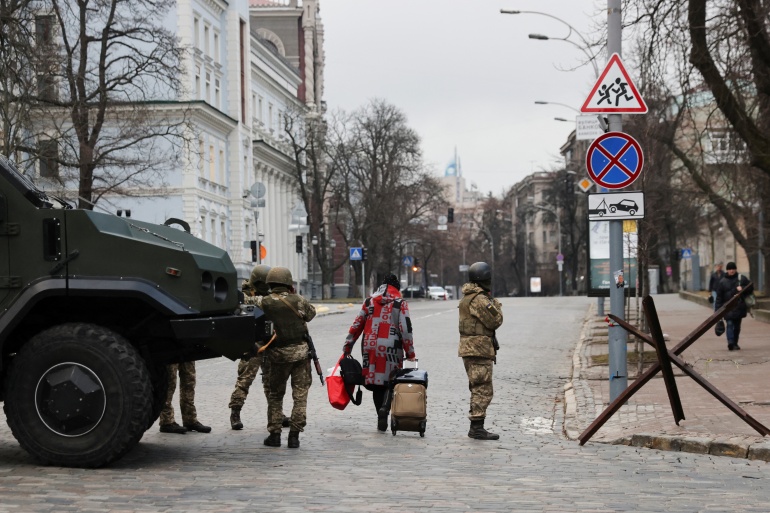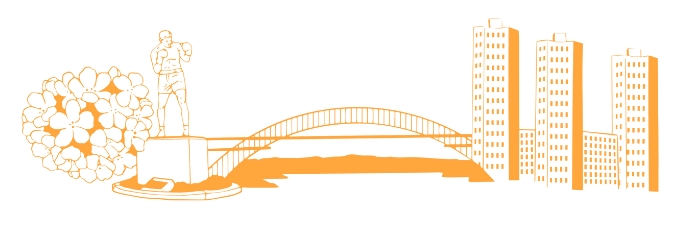Russian President Vladmir Putin’s invasion of Ukraine has caused rippling effects throughout the world.
But not everyone understands it, and not everyone understands international politics, let alone national politics. Slice of Culture brought on Journalist, Socialist and Code Pink’s Weekend Social Media Manager Sam Carliner for a conversation on the Russia-Ukraine war.
Carliner is also a writer for Left Voice, a socialist publication, and has had his work published in Teen Vogue and Common Dreams, to name a few. He also wrote an opinion piece of Julian Assange for Slice of Culture in October of 2020.
In the first two parts, Carliner gave the background of how history between Ukraine and Russia played a huge part in the invasion and dove further in-depth on the ongoing attacks. In Part 3, Carliner will explain sanctions, no fly-zone and why Russia is so threatened by Ukraine potentially joining NATO.
As of Thursday night, Russia’s invasion has been going on for a month. But Russia’s forces are being pushed back around Kyiv and are taking defensive positions northwest of the capital, a US official told CNN. World leaders met in Brussels for emergency summits of NATO and the G7, announcing new sanctions and refugee assistance.
Ukrainian President Zelensky was short of requesting a no-fly zone, but did call for military assistance and improved air defenses, CNN reported.
As of earlier this week, 902 civilians have been killed and another 1,459 have been wounded, The Office of the UN High Commissioner for Human Rights said via NPR.
Related:
RUSSIA-UKRAINE WAR: BREAKING DOWN HOW WE GOT HERE
RUSSIA-UKRAINE WAR: INSIDE THE INVASION
Adrienne:
Yeah. Let’s go into [sanctions and no fly-zone] because I did see you on Twitter saying how these sanctions aren’t as good as some people may think they are and I’ve seen the “No fly-zone” being suggested.
Sam:
So essentially we know we live in sort of an internationally connected economy.
Sanctions are essentially when one country uses its influence over the internet to weaken another country’s standing, and the US has done this a lot.
Trump in particular really normalized this idea of sanctioning countries that the US didn’t have influence over. So he launched what he called max pressure sanctions on Venezuela and Iran.
And the results of this were that in Venezuela, it resulted in food imports, not reaching the country. And so like literally Venezuela citizens starved to death as a result of these sanctions.
In Iran, it prevented medical supplies, which kept people from receiving cancer treatment. Then during the pandemic, it made Iran, a particularly hard hit place.
Sam:
Just a few months ago, people learned that the Afghanistan economy was just completely collapsing. And while obviously like the Taliban has their own disgusting things they’re doing to the country, a lot of the reasons that Afghan people were economically hurt [because] the US used its power to completely freeze the economy. And that meant that people couldn’t get any money. And it was causing a lot of deaths in the refugee crisis.
And that is, that is sort of the impact of sanctions. Sometimes it’s more extreme, like in the very extreme example of Afghanistan, sometimes it’s like, you don’t hear about it as much, but it still hurts people like with Venezuela and Iran.
Sam:
There’s been a lot of economic responses, but I think it’s important for people to understand that even these calls for targeted sanctions, which are only directed at Putin and oligarchs, will still mainly impact the average Russian citizen. [But] these leaders know sanctions are a thing and they have more wealth, so they can better insulate themselves.
So it is just the average Russian person who is impacted by this. And I would say Ukrainians, like, even though a lot of Ukrainians are asking for this, I think it makes sense. They’re asking for it. They are dealing with a very powerful country by assaulting them.
Sam:
But, and I think it makes sense that they’re asking for sanctions out of desperation. But I do think for people who aren’t impacted and don’t like basing what they call off of a genuine fear and a genuine desperation, we have a responsibility to really look at, ‘Okay. Like how will these sanctions really impact the situation?’ And every single analysis of sanctions points to it’s gonna really just cause even more of a threat to Ukrainians economically.
Russians, many of whom are resisting Putin in the streets right now, those are the people who will most be hurt by these things.
I don’t think people should only care because it impacts them, but I do think people should understand that … We’re sanctioning like with Russia, this is gonna really hurt like poor people and working people all around the world, including in the US like sanctions are a really, really dangerous form of economic warfare.

Yeah. A no fly zone, what it means. So there’s, so there’s a difference there’s because I have been seeing like a lot of countries are closing down their airspace to Russian planes, like Russians can’t land, Russian planes can’t land.
…A no fly zone is a different thing. That’s not like Russian planes aren’t allowed to land. That means that essentially militaries and countries set up missile systems and like troop arrangements. So that if a Russian plane flies in an area, that’s a no fly zone, the military on the ground will shoot that plane down.
And so if NATO and the US were to set up a no fly zone over Ukraine, that would mean that we would get into a scenario where the US military or a European military could literally shoot down a Russian plane.
And that would essentially be a declaration of the US’ militarily getting involved in this conflict.
Biden seems to understand at least this. I’ve had very big disagreements with how he’s handled this, but even he seems to understand just how dangerous it would be to set up a no fly zone.
I do think that I worry that if more and more people call for it, that risks him changing his mind. And so I think people should also understand the implications of that.
Adrienne:
Absolutely. Yeah. So, Biden did his state of the union last night [on March 1]. Did you get a chance to see what he said or listen to it?
Sam:
I didn’t, I was so exhausted from reading all the foreign policy news. I’ve been lacking on national news. So I read the spark notes version.
I’ve heard, he said a lot about essentially like the general stuff he’s been saying about like Putin is the aggressor and the US stands up to the police.
I think he’s wrong. Like I do think that yeah, Putin is at this point, the aggressor towards Ukraine, right? If we’re just looking at the regional context of the war between Ukraine and Russia, Putin is the aggressor.
I fully agree. Of course, if we’re talking about the international, like geo takes of the world, I do think that the US and NATO have been extremely provocative in just how much they’ve just carelessly expanded throughout Europe while Russia was actively saying like, ‘Hey, we can only take this for so long.’ We will militarily act if you keep doing it and the US and NATO just keep expanding.
Adrienne:
Yeah. Yeah. And so, with the US and NATO, cause not, you know, but not everyone knows about NATO really. Why was Russia or is Russia so threatened with Ukraine potentially, you know, being persuaded to join NATO?
Sam:
Yeah. So it goes back to that. I mean, one NATO was a military Alliance set up to contain the Soviet union. So when the Soviet Union fell, it kind of made no sense for this Alliance to exist.
…So the logical thing would’ve been like, ‘okay, the whole reason NATO was set up is gone. Now it shouldn’t continue to exist.’
But it did. And it added countries that used to belong to the Soviet union. And the reason that Ukraine specifically was a hard line for Russia is that Ukraine is like right next to Russia, it’s on the border.
And so if Ukraine were to enter NATO, that would mean that NATO countries can put missiles and within a distance of Russia that like if NATO decided one day, it just wanted to strike Russia. Like Russia wouldn’t have time to respond. Like that’s the threat of Ukraine specifically.
Adrienne:
Okay. Got it. Yeah. That definitely makes more sense now, and I’m sure it will to everyone who reads this.
Stay tuned for Part 4, which will be posted next week. Follow @sliceofculture on Instagram to stay up to date.


